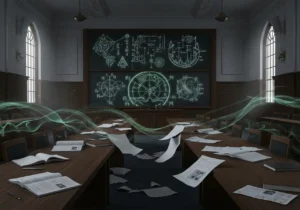In 2025, R.F. Kuang, acclaimed author of The Poppy War trilogy, presents her newest work, Katabasis—a genre-defying fantasy novel that combines elements of academia with an exploration of the afterlife. Drawing on her expertise in history and politics, Kuang creates a haunting, thought-provoking narrative that delves into the complexities of human existence, the pursuit of knowledge, and the grieving process. Katabasis is a book that will captivate not only fantasy lovers but also those who appreciate academic themes and profound reflections on the human experience.
Plot Overview: A Journey Through Academia and the Afterlife
Katabasis follows the story of two doctoral candidates, Yumi and Theo, whose lives take a dark turn when their beloved thesis advisor, Dr. Nash, disappears. Despite the initial assumption that he is simply lost or gone into seclusion, Yumi and Theo soon uncover a much darker truth: Dr. Nash has descended into the afterlife—a hellish realm—and is being held there. Desperate to save him, Yumi and Theo embark on a perilous journey into the depths of this supernatural world, facing both literal and metaphorical challenges.
The title itself—Katabasis—refers to an ancient Greek term meaning a descent to the underworld. This theme is explored throughout the novel, not only through the literal journey of the characters but also through the intellectual and emotional descent that each character undergoes as they confront their personal demons. The blend of a traditional academic setting with fantasy elements creates a unique atmosphere, where the struggle between knowledge, duty, and human emotion takes center stage.
Themes of Academia and Grief
 At its core, Katabasis is a meditation on the relationship between knowledge and loss. The novel examines how academia, as a discipline rooted in the pursuit of knowledge, often neglects the emotional and personal tolls that accompany the quest for achievement. Yumi and Theo, both brilliant and driven, must come to terms with the reality that their intellectual endeavors cannot shield them from the harsh truths of life and death.
At its core, Katabasis is a meditation on the relationship between knowledge and loss. The novel examines how academia, as a discipline rooted in the pursuit of knowledge, often neglects the emotional and personal tolls that accompany the quest for achievement. Yumi and Theo, both brilliant and driven, must come to terms with the reality that their intellectual endeavors cannot shield them from the harsh truths of life and death.
Kuang deftly explores the tension between scholarly ambition and emotional vulnerability, challenging the often cold, detached nature of academia. As Yumi and Theo venture into the underworld, their relationship with Dr. Nash—and with each other—becomes strained by the very weight of their academic pursuits. The exploration of grief, loss, and healing runs parallel to their literal journey, creating a deeply emotional experience for readers.
The underworld, where Dr. Nash is trapped, is not just a fantasy world. It also represents the burdens of personal trauma and unaddressed emotions that each character has carried into adulthood. This clever fusion of academic exploration and emotional depth is what sets Katabasis apart from other fantasy novels.
World-Building and the Afterlife
 As with her previous works, Kuang excels in creating an immersive world that feels both authentic and richly detailed. In Katabasis, the underworld is not merely a backdrop for the action but an active force that shapes the characters’ experiences. Kuang draws on mythology, historical references, and her own imagination to craft a vivid and eerie realm that is both beautiful and terrifying.
As with her previous works, Kuang excels in creating an immersive world that feels both authentic and richly detailed. In Katabasis, the underworld is not merely a backdrop for the action but an active force that shapes the characters’ experiences. Kuang draws on mythology, historical references, and her own imagination to craft a vivid and eerie realm that is both beautiful and terrifying.
The novel’s portrayal of the afterlife challenges traditional representations of hell. Instead of depicting it as a place of eternal torment, Kuang introduces a more nuanced and reflective interpretation. The afterlife in Katabasis is a labyrinthine space where characters must confront their deepest fears, regrets, and desires. It is a place where knowledge is both a weapon and a curse—providing insight into the human condition but also serving as a reminder of the limitations of human understanding.
One of the most striking features of the world-building in Katabasis is its intellectual dimension. Kuang incorporates philosophical and literary references throughout the novel, as the characters encounter different intellectual challenges in the underworld. This focus on the philosophical is not just a superficial layer but an integral part of the plot. The characters’ understanding of the afterlife evolves as they grapple with complex ideas, and these intellectual confrontations form a key part of the narrative.
Character Development and Relationships
The relationships between the characters are central to Katabasis. At the outset, Yumi and Theo are two driven, intellectual young people, united by their shared commitment to academia and their love for their advisor, Dr. Nash. However, their journey into the underworld forces them to confront their own insecurities, emotional baggage, and long-held beliefs.
Yumi, the more reserved of the two, begins the novel as a quiet observer—someone who is comfortable in the intellectual world but not necessarily in the emotional one. Her journey through the underworld forces her to reckon with her own grief and unresolved emotions, both regarding Dr. Nash and her own personal losses.
Theo, on the other hand, is impulsive and outspoken. His emotional journey mirrors Yumi’s but takes a more intense turn as he struggles to come to terms with his past and the complexities of his relationship with Dr. Nash. The dynamic between Yumi and Theo is both touching and tense, offering readers a deep look at how people navigate their personal and intellectual connections.
Dr. Nash himself is a compelling figure, embodying the tension between academia and the human experience. His disappearance and the characters’ quest to find him highlight his role as a mentor but also as someone whose intellectual pursuits have led him to a dangerous obsession. Through his character, Kuang explores the ways in which the academic world can both nurture and consume.
The Reception and Critical Acclaim
Upon its release in August 2025, Katabasis was met with widespread critical acclaim. Critics praised the novel’s unique fusion of fantasy and academic themes, as well as its thought-provoking exploration of grief, loss, and the search for meaning. Many hailed it as a masterpiece of modern fantasy, drawing comparisons to works by authors like Neil Gaiman and Ursula K. Le Guin.
Katabasis quickly became a bestseller and was included in several “Best of 2025” lists. Its intellectual depth and emotional resonance appealed to readers from both the fantasy and literary fiction communities, expanding the reach of fantasy literature.
Additionally, the rights to Katabasis have been acquired by Amazon MGM Studios, with a television adaptation already in development. The book’s themes, world-building, and character-driven story are expected to translate well to the screen, offering a captivating viewing experience for both existing fans and newcomers.
Conclusion: A Modern Fantasy Classic
R.F. Kuang’s Katabasis is a stunning work of fantasy that transcends the genre, blending intellectual depth with emotional resonance. Through its exploration of academia, grief, and the afterlife, the novel offers a fresh and thought-provoking perspective on the human condition. Whether you are a fan of fantasy or simply a reader looking for a novel that challenges both your intellect and emotions, Katabasis is a book that will leave a lasting impact.
